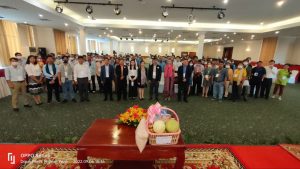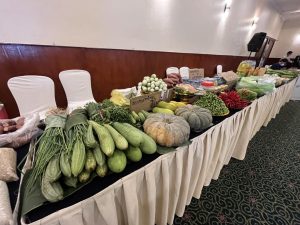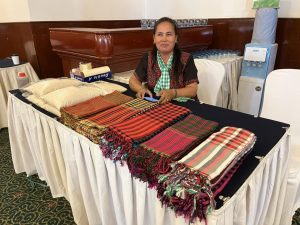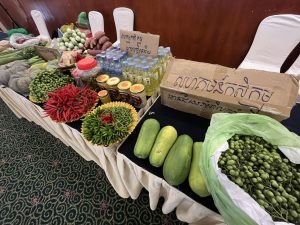Phnom Penh, 06 – 07 September 2022
 The Agricultural Cooperative Business Forum on Promoting Youth Participation in Leadership & Management of Agricultural Cooperative Businesses was held in Phnom Penh on 06 – 07 September 2022. The forum was organized by CamboDHRRA with partnership of partner organisations that are supporting agricultural sector such as FNN, FCFD, FWN, DCA, FCA, WVI-C, CACA, CPSA, AFD, DPA, NGO-F, HEIFER International Cambodia, LWD, IIRR, WorldRenew, OREDA, DKT, AMRU RICE, KOC, CACC, SOA, MCC, KPY, and BAC.
The Agricultural Cooperative Business Forum on Promoting Youth Participation in Leadership & Management of Agricultural Cooperative Businesses was held in Phnom Penh on 06 – 07 September 2022. The forum was organized by CamboDHRRA with partnership of partner organisations that are supporting agricultural sector such as FNN, FCFD, FWN, DCA, FCA, WVI-C, CACA, CPSA, AFD, DPA, NGO-F, HEIFER International Cambodia, LWD, IIRR, WorldRenew, OREDA, DKT, AMRU RICE, KOC, CACC, SOA, MCC, KPY, and BAC.
The Agricultural Cooperative Business Forum aims to:
• To learn and share best practices and challenges of youth participation in leading and managing agricultural cooperative business.
• To learn and share about strengthening short value chain and local market systems
• To identify key initiatives and find mechanisms and means to promote youth participation in leading and managing agricultural cooperative businesses.
The forum brought together key stakeholders over 180 participants from government representatives, cooperative business leaders, youth leaders, development partners, civil society, NGOs, and the private sector. The objective of the forum was to discuss ways to promote youth participation in leadership and management positions in agricultural cooperatives.
The forum highlighted the importance of young people’s participation in the country’s agricultural development. It also emphasized the need for policies and programs that support youth involvement in cooperatives. In addition, the forum called for greater investments in capacity-building and training for young cooperative leaders and managers.
The ACBF concluded with suggestions included the following:
• The board of directors of the agricultural cooperative shall have a mechanism for coordinating the promotion of youth participation in the cooperative. On possible priority of practical activities, the Board of Directors of the agricultural cooperative shall advocate for the youth’s active participation in cooperative activities by promoting active participation in cooperative activities. Partners and associated partners include the local government, the partner organization, and the youth representative.
• To ensure the long-term viability of agricultural cooperatives, it is essential to engage and attract youth in cooperative activities. This can be accomplished in a number of ways, including: providing training and education on the benefits of cooperatives and how they operate; encouraging young people to participate in cooperative activities through internships, mentorship programs, and other initiatives; creating opportunities for young people to assume leadership roles within cooperatives; and supporting existing cooperatives to become more youth-friendly and inclusive. Increasing the appeal of agricultural cooperatives to young people is crucial for ensuring their long-term viability and success. By taking measures to engage young people in cooperative activities, we can ensure that future generations enjoy the benefits of these vital organizations.
• The board of directors of the agricultural cooperative should evaluate the conditions and plan for integrating youth in any position, as well as the opportunity for youth to participate in cooperative activities, to ensure a satisfactory outcome. Priority and practical activities must include regular evaluation meetings on conditions and planning, which should be led by a young adult and incorporate women into positions of advocacy within the cooperative. Partners include members of the agricultural cooperative’s board of directors and evaluation committee.
• It is crucial to implement specific mechanisms that encourage youth participation in leadership and business management in agribusiness cooperatives. This will ensure that the youth have skills and knowledge necessary to effectively assume these responsibilities. Establishing a mechanism for petty cash advances is one way to achieve this. This will enable youth to implement business activities and produce informative content for cooperative, youth capacity development, and educational field trips. Providing training and support to young people who are interested in assuming leadership roles is another crucial strategy for increasing youth participation in agribusiness communities. This will ensure that they possess the necessary abilities and self-assurance to succeed in these positions. In addition, it is essential to provide opportunities for youth to network with one another and with members of the agribusiness community. This will enable them to exchange ideas and gain knowledge from one another’s experiences. By implementing these particular mechanisms, youth will be better equipped to assume leadership and business management roles.
• With the assistance of agricultural cooperative NGOs, government institutions, and private sectors, create an open internship opportunity in agricultural cooperatives for youth and students as a favorable environment for enhancing youth capacity.
• Create incentives for youth participation in the management and distribution of the business’s profits. First, this could be accomplished by revising the memorandum’s evaluations condition to permit youth participation. Second, create loans for agricultural entrepreneurs to support the successful implementation of their businesses, with the participation of NGOs, banks, microfinance institutions, and the agricultural community.
• Promote the benefits of youth participation and the incorporation of an understanding of agricultural work into the curriculum, while ensuring youth representation on the agricultural cooperative’s committee. This will ensure the economic and employment stability of the income market.
For more detail report:Final_Report_ACBF2022

 Cambodhrra Cambodian Partnership for Development Human Resource in Rural Area Association
Cambodhrra Cambodian Partnership for Development Human Resource in Rural Area Association








